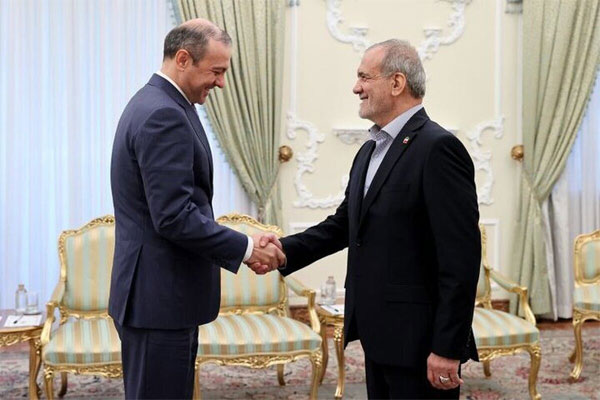Daijiworld Media Network - Tehran
Tehran, Aug 31: Iranian President Masoud Pezeshkian has called for increased vigilance against external forces attempting to disrupt the “friendly and strategic” partnership between Iran and Armenia, amid growing geopolitical shifts in the Caucasus region.
During a meeting in Tehran with Armen Grigoryan, Secretary of Armenia’s Security Council, President Pezeshkian reiterated the importance of safeguarding the bilateral relationship from foreign interference. He expressed satisfaction with the outcome of his recent visit to Armenia, calling the trip “successful and fruitful,” with “constructive talks and positive agreements” between senior officials of both nations.
Referring specifically to the peace deal signed on August 8 between Armenia and Azerbaijan, Pezeshkian noted that Iranian concerns were eased following clarifications provided by Armenian leadership. The peace agreement, brokered in Washington, includes a controversial plan for a transit corridor through southern Armenia, with exclusive development rights granted to the United States—a move Iran has repeatedly viewed with suspicion.

“We should move in a way so that no foreign power can disrupt the two countries’ friendly and strategic relations,” Pezeshkian said, emphasizing Iran’s firm opposition to any foreign military or political presence that could destabilize the Caucasus or alter historical borders.
He also highlighted the need to deepen economic cooperation, urging both nations to facilitate trade and increase joint investments as a pathway to boosting bilateral economic transactions.
Grigoryan echoed this sentiment, calling Iran a strategic partner and stating Armenia’s willingness to sign a comprehensive strategic cooperation agreement. He added that Armenia is ready to expand bilateral trade several-fold, signaling a major economic pivot in the wake of recent geopolitical realignments.
The long-running Armenia-Azerbaijan conflict over Nagorno-Karabakh, ongoing since 1988, reached a turning point with the August peace accord, but the deal has raised regional concerns—particularly for Tehran. Iran continues to issue strong warnings against any attempt by transregional powers to redraw borders or reshape the region’s geopolitical balance.
As Armenia strengthens ties with Iran while inching closer to Western-backed projects, Tehran appears determined to ensure it remains a decisive player in the evolving dynamics of the South Caucasus.